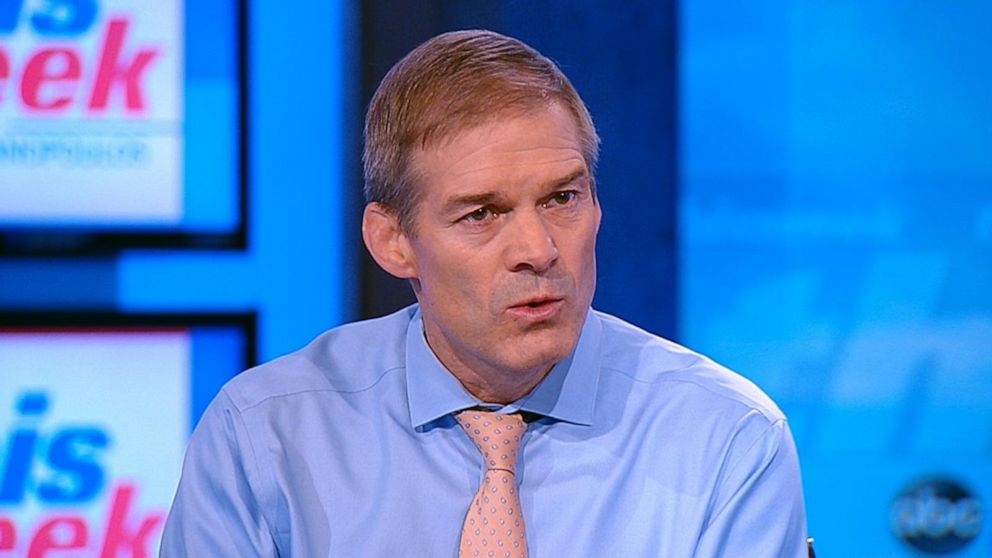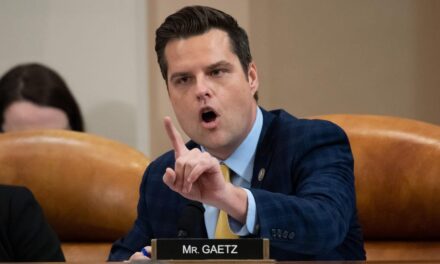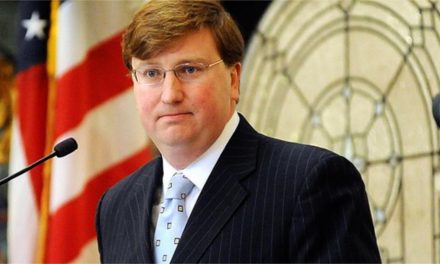As the New York Times reports, the Republicans spent the weekend backing away from their previous strategy of insisting that the Democrats have not provided any firsthand witnesses to the president’s instructions on Ukraine. That talking point will become less and less effective over time, starting with the testimony of E.U. ambassador Gordon Sondland this week. Should former national security advisor John Bolton ever testify, the “firsthand” argument will become completely inoperative.
So, instead, the president’s congressional and media defenders are shifting to a blanket defense that he did nothing wrong. This is typified by an argument Rep. Jim Jordan of Ohio began making during former Ukraine ambassador Marie Yanukovitch’s testimony on Friday.
“The Ukrainians did nothing to — as far as investigations goes — to get the aid released,” Representative Jim Jordan of Ohio, one of Mr. Trump’s chief defenders, said on CBS’s “Face the Nation.” “So there was never this quid pro quo that the Democrats all promise existed.”
This has a surface plausibility. Trump wanted the Ukrainian president to publicly announce that he was looking into the possibility that some of his countrymen had interfered in the 2016 campaign to help Hillary Clinton and perhaps had possession of one of the hacked DNC servers. Trump wanted Zelensky to go on CNN and state that he was investigating possible corruption on the part of Joe and Hunter Biden. But Zelensky never actually did either of those things.
On September 11, Trump released the aid to Ukraine, and he met with Zelensky at the United Nations in New York City on September 25. As has now been well-established, the president had refused to meet personally with Zelensky prior to September and put a hold on the military aid in an effort to pressure Zelensky into meeting his demands for “investigations.” But Zelensky eventually got the aid and a meeting despite never delivering on his end of the bargain.
However, these talking points are extraordinarily weak.
To demonstrate this, I need to put a few things in a timeline for you.
On July 18, the Office of Management and Budget announces to Pentagon and State Department officials that the aid packages to Ukraine are on hold.
On July 25, Trump has phone call with Ukrainian president Zelensky and demands investigations in return for javelin missiles.
On July 28, Director of National Intelligence Dan Coats announces his resignation, effective August 15.
On August 14, 2019, CIA General Counsel Courtney Simmons Elwood and deputy White House counsel John A. Eisenberg call John Demers, the head of the Justice Department’s national security division, and refer the whistleblower’s case for possible criminal investigation.
On August 15, 2019, Director of National Intelligence Dan Coats’s resignation becomes effective. Principal Deputy Director Sue Gordon also resigns after President Trump makes it clear that he doesn’t want her in the job.
On August 26, 2019, the Inspector General for the Intelligence Community, Michael Atkinson, forwards the whistleblower complaint to the acting Director of National Intelligence, Joseph Maguire.
On August 28, an article was published in Politico that publicly revealed a hold on Ukrainian military assistance initiated by the Office of Management and Budget back on July 18.
On September 9, after being briefed on the whistleblower report by Michael Atkinson, three Democrat-controlled House committees announced the launch of a “wide-ranging investigation” into whether military aid is being withheld in order “to pressure the government of Ukraine to assist the President’s reelection campaign.”
On September 10, national security adviser John Bolton was either fired or resigned, depending on who you ask. Prior to this, he quietly authorized the release of the State Department’s portion of Ukrainian aid.
…shortly before Sept. 9, Bolton had relayed a message to the State Department that the funding could go ahead. It’s not clear whether Bolton, who resigned from the job a week later, did so with Trump’s approval.
Bolton’s handling of the funding struck officials in the White House as violating protocol and caught [White House chief of staff Mick] Mulvaney by surprise, according to another person familiar with the matter.
On September 11, the State Department informs Congress that their aid package has been released, formalizing the decision Bolton had made before quitting/being fired.
On September 12, the formal announcement came that the Pentagon’s aid package had been released too.
As you can hopefully see, the White House did not release the aid until after it became publicly known that there was a hold. They didn’t release it until after congressional committees announced an investigation into a potential quid pro quo. The State Department portion was actually released by John Bolton on his own authority, and the Pentagon portion wasn’t rebased until after Bolton was gone.
The timing was unfortunate for Trump because it’s now well-established that Zelensky was preparing to meet the president’s demands and make an announcement about investigations during an interview with Fareed Zakaria on CNN.
The New York Times reported on Thursday that Zelensky had planned to announce an investigation into Trump’s political rivals during a September interview on CNN, but those plans had been scrapped once Trump released promised security aid. Zakaria told CNN’s Brooke Baldwin on Thursday that the interview had been months in the making, but it fell apart when the Ukraine scandal began to unfold…
So, Ukraine wasn’t freed from Trump’s pressure by a change of heart on Trump’s part. Bolton appears to have betrayed Trump as a kind of last act. The rest of the aid was released once the cat was already out of the bag.
As for the meeting with the president, Zelensky never received the White House meeting he desired. The meeting at the United Nations would have been a poor substitute in any circumstance, but was made infinitely more unsatisfactory when Trump decided to release the “transcript” of their July 25 call without giving Zelensky any prior notice.
The White House annoyed and embarrassed Ukraine’s president by releasing his comments in a private conversation with President Donald Trump — and may have violated the Ukrainian constitution.
The rough transcript of Trump’s call with Ukrainian President Volodymyr Zelenskiy released Wednesday shows that Trump pressed Ukraine to “look into” his Democratic political rival Joe Biden. The July 25 call is now at the center of a U.S. impeachment probe.
“I think such things, such conversations between heads of independent states, they shouldn’t be published,” Zelenskiy told reporters at the U.N. General Assembly in New York.
So, when Rep. Jim Jordan says that Ukraine could not have been pressured since they received the aid without Trump receiving the investigations, that’s inaccurate. The suggestion that they were not harmed is also ludicrous, since the whole world now knows that the president of the United States does not consider them an ally. This will hurt their efforts to negotiate a satisfactory peace with Russia.
Apparently, 70 percent of Americans disagree with Rep. Jordan’s assertion that Trump did nothing wrong, and a majority want him removed from office as punishment. This suggests to me that the new talking points aren’t going to be any more effective than the old ones.







